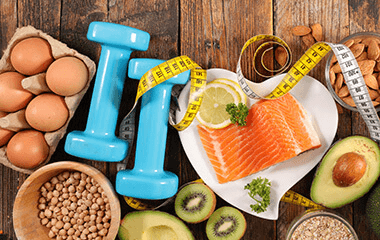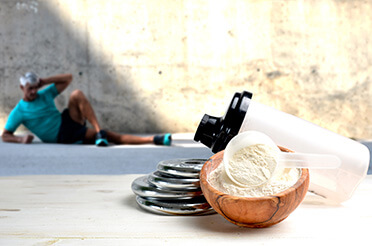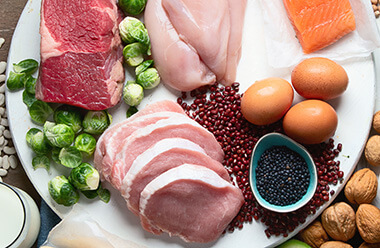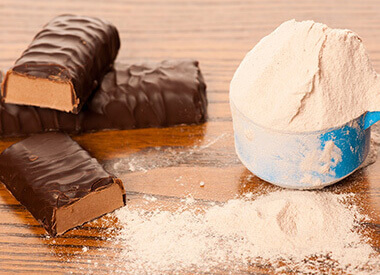Benefits of Protein For Sports Performance
Protein, the classic all-around fitness lovers favourite food group, whether it be in the form of high protein foods or nutritional supplements.
You probably associate it with the big muscles, wide frame, and caveman-like appearance of these stereotypical bodybuilders you see stunting around today. And you wouldn't be wrong in doing so when it does tend to make up the majority of their diet.
But, is there more to this basic dietary requirement than just packing on another slab of weight pumping flesh?

In this article we’ll take a closer look at the multitude of benefits of protein, how to get more protein into your diet, and how that directly corresponds to sports performance.
Let’s dive right in!
Benefits of Protein
From a young age, we’ve always been told to eat our protein or we won’t grow up big and strong. And still, to this day many leading brands in the food industry place particular emphasis on the protein content of their products when designing advertisement campaigns.
They don’t do this by chance, in fact, the British Nutrition Foundation recommend a daily amount of protein for the average sedentary man of 56 grams and for a sedentary woman coming in at just under 45 grams respectively. To put these figures in percentage terms it works out at around 35% of your total calories all coming from protein.
But why are these recommended figures so high? Here’s a list of the main benefits of protein:
- Good for hair, skin, nails, and bones
- Builds muscle mass and increases strength
- Blunts appetite and hunger levels helping maintain a healthy weight
- Helps lower blood pressure
- Boosts metabolism and speeds up fat burning
- Fights against age-related muscle deterioration
- Aids in the transportation of oxygen and vital nutrients around the body
- Produces enzymes to help with digestion
- Plays a major role in hormone regulation
It’s easy to see why the benefits of protein lead many experts to consider it as being the building blocks of life and why getting more of it in your diet every day will do wonders for your body — inside and outside the gym.
How Protein Affects Sports Performance

When it comes to sports performance, protein plays a vital role in how your body both performs and recovers.
Think of your body as a high-performance sports car. Each time you go for a drive the car gets put through its paces, and ultimately some maintenance needs to be done to prevent it from breaking down.
Your body is exactly the same, and each time you workout you need to get more protein in to refuel and repair the breakdown of muscle tissue and fibres that occur during a workout.
If you run on treadmills and use cross trainers frequently, or do any cardio-based exercises to stay fit and in shape, you will need to eat a diet high in protein. This will enable your body to preserve the muscle you already have and prevent muscle wasting which is common with this type of exercise.
Likewise, if your goal is to add some muscle mass to increase strength and performance for your next workout then eating more protein will provide your muscles with the proper nutrients to grow.
Furthermore, injury is common with any sports-based exercise and you’re likely to encounter one from time to time. High protein foods will help your body repair itself quicker and have you back working up a sweat on the rowing machine in no time!
How Much Protein Do You Need?
Now that we’ve covered the benefits of protein and why it's important to anyone who works out regularly, it’s time to take a closer look at how much of this perfect little polypeptide different individuals need.
Earlier we touched on the average sedentary man and woman's daily protein requirements to be around 50 grams, but it's important to note these figures are going to increase slightly for a person who likes to hit the cardio machines on a regular basis.
As a basic rule of thumb for most active and relatively healthy adults who work out often and wish to maintain weight or build muscle, your recommended protein intake should be kept around 0.7-1 gram per pound of body weight each day.
This slight increase in protein levels can help build muscle by helping your body to synthesise more muscle protein than it breaks down. Furthermore, when dieting muscle loss is common and higher protein levels will help you keep the muscle you’ve worked so hard to build.
However, there are still many experts within the health industry that disagree with the idea of eating higher amounts of protein.
Several studies have shown that our bodies can only break down 20-30 grams of protein at a time and if we consume larger amounts it just gets flushed out during urination. What’s more, people that suffer from kidney problems have also been shown to be at a greater risk of more damage from increased protein intake.
How to Get More Protein into Your Diet Without Supplements?

Getting more high protein foods into your diet without having to supplement might seem like a real struggle at first, let's face it, who wants to munch through copious amounts of bland chicken breast for every meal? That’d be one sure-fire way to scar you for life, and who knows you might even take flight the next time you’re on the treadmill!
Jokes aside, getting more protein is actually very easy once you know what foods to consume. Here’s a list of these high protein foods and their corresponding protein levels compiled into the table below to help you get started:
High Protein Foods
Poultry & Eggs
- Chicken 27g/100g
- Turkey 29g/100g
- Duck 19g/100g
- Regular Eggs 13g/100g
- Duck Eggs 13g/100g
- Quail Eggs 13g/100g
Nuts & Seeds
- Almonds 21.1g/100g
- Walnuts 15g/100g
- Cashews 18g/100g
- Brazil Nuts 14g/100g
- Pecans 9g/100g
- Pumpkin Seeds 30g/100g
- Sunflower Seeds 21g/100g
- Chia Seeds 17g/100g
Fish & Seafood
- Salmon 22g/100g
- Sardines 19.8g/100g
- Tuna 28g/100g
- Prawns 24g/100g
- Lobster 27g/100g
- Crab 19g/100g
- Mussels 24g/100g
- Oysters 9g/100g
Dairy Products
- Whole Milk 3.2g/100g
- Skimmed Milk 3.4g/100g
- Plain Yogurt 5.3g/100g
- Non-Fat Greek Yogurt 10.2g/100g
- Cheese 22.9g/100g
- Cottage Cheese 11.1g/100g
Lean Meats
- Beef 26g/100g
- Lamb 25g/100g
- Veal 24g/100g
- Pork 27g/100g
Legumes & Beans
- Pinto Beans 21g/100g
- Broad Beans 8g/100g
- Kidney Beans 24g/100g
- Lentils 9g/100g
- Chickpeas 19g/100g
- Split Peas 5g/100g
- Soy Beans (Tofu) 12.3g/100g
- Cannellini Beans 7.1g/100g
Phew… you can actually eat other foods besides chicken breast!
Hopefully, you’ve now got a better idea of how to get more protein into your diet through the range of high protein foods available to make it easier for you to reach your goals and keep things tasty while doing so.
Protein From Supplements
Protein supplements have taken the market by storm in the last few years. Their convenience, ease of use, and availability are some of the main reasons many people choose to include them in their diet as opposed to going with a 100 per cent whole foods approach.
The most popular protein supplements you will find include:
- Whey protein powder
- Protein bars
- Protein cookies
- Protein chocolate brownies
All of these supplements aim to pack a good amount of protein into a relatively small serving size making reaching your daily protein intake very easy.

Whey is by far the most popular and many companies have developed their own special formulas.
Essentially though, it’s just one of the primary proteins found in dairy products which are made into a dry dissolvable powder and usually come in a range of different flavours. Whey can easily be made into a shake in a matter of minutes by mixing with milk or water and taken with you on the go.
However, you need to be cautious before choosing to include these types of supplements in your diet as many are filled up with added sugar, calories, and even harmful toxins!
Summary
Protein is an essential part of everyone's diet. It is used to help our bodies repair and rebuild damaged cells and perform normal daily functions.
If you live an active lifestyle and work out often your protein requirements will increase. Making sure you get the right amount each day will have a positive impact on your sports performance and recovery.
It’s best to try and get the bulk of your protein from whole food sources to reap the most benefits.
To learn more about high protein meal ideas check out our Meal Ideas for Fitness Fans blog.
Want more diet and nutrition advice? Sign up for our monthly emails.





